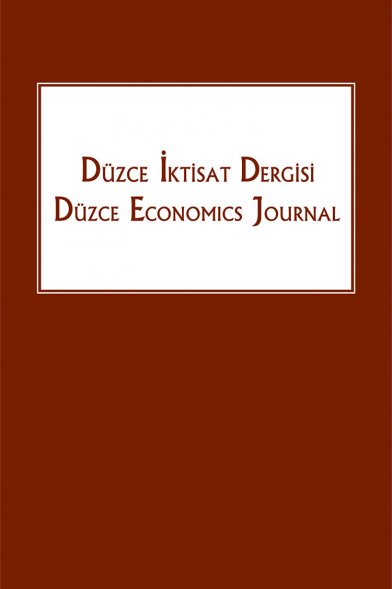Frequency Domain Causality Analysis of the Energy- Economic Growth Relationship for Turkey
Türkiye, Sanayi Üretim Endeksi, Elektrik Tüketimi, Frekans Alanı Nedensellik Analizi
Türkiye İçin Enerji- Ekonomik Büyüme İlişkisinin Frekans Alanı Nedensellik Analizi
Turkey, Industrial Production Index, Electricity Consumption, Frequency Domain Causality Analysis,
___
Akarca, A. & Long, T. V. (1980). On the relationship between energy and gnp: a reexamination. Journal of Energy and Development, 5, 326– 331.
Altinay, G. & Karagol, E. (2005). Electricity consumption and economic growth: evidence from Turkey. Energy Economics, 27(6), 849-856.
Aqeel, A. & Butt, M.S. (2001). The relationship between energy consumption and economic growth in Pakistan. Asia-Pacific Development Journal, 8(2), 101-110.
Arora, V. & Shi, S. (2016). Energy consumption and economic growth in the United States, Applied Economics, 48(39), 3763-3773.
Aydın, M. (2020). Enerji tüketimi- ekonomik büyüme ilişkisi: Türkiye için frekans alanında nedensellik yaklaşımı. Erciyes Üniversitesi İktisadi ve İdari Bilimler Fakültesi Dergisi, 56, 83-96.
Breitung, J. & Candelon, B. (2006). Testing for Short and Lon Run Causality: A Frequency Domain Approach. Journal of Econometrics, 132(2), 363-378.
Cheng, S. B. & Lai, T.W. (1997). An ınvestigation of cointegration and causality between energy consumption and economic activity in Taiwan province of China. Energy Economics, 19, 435– 444.
Erbaykal, E. (2008). Disaggregate energy consumption and economic growth: evidence from Turkey. International Research Journal of Finance and Economics, 20, 172-179.
Erdal, G., Erdal, H. & Esengün, K. (2008). The causality between energy consumption and economic growth in Turkey. Energy Policy, 36(10), 3838-3842.
Erol, Ü. & Yu, E. S. H (1987). On the causal relationship between energy and ıncome for ındustrialized countries. Journal of Energy and Development, 13, 113-122.
Ertuğrul, H. M. (2011). Türkiye’de elektrik tüketimi büyüme ilişkisi: dinamik analiz. Enerji, Piyasa ve Düzenleme, 2, 49-73.
Esen, Ö. & Bayrak, M. (2017). Does more energy consumption support economic growth in net energy-ımporting countries? Journal of Economics, Finance and Administrative Science, 22(42), 75-98.
Geweke, J. (1982). Measurement of linear dependence and feedback between multiple time series. Journal of The American Statistical Association, 77 (378), 304-313.
Granger, C. W. J. (1969). Investigating causal relations by econometric models and cross-spectral methods. Econometrica, Econometrica, 37(3), 424-438.
Hamilton, J. D. (1983). Oil and the macroeconomy since World War II. The Journal of Political Economy, 91(2), 228-248.
Korkmaz, Ö. & Develi, A. (2012). Türkiye’de birincil enerji kullanımı, üretimi ve Gayri Safi Yurt İçi Hasıla (Gsyih) arasındaki ilişki. Dokuz Eylül Üniversitesi İktisadi ve İdari Bilimler Fakültesi Dergisi, 27(2), 1-25.
Kraft, J. & Kraft, A. (1978). On the relationship between energy and gnp. Journal of Energy and Development, 3, 401-403.
Narayan P. K. & Smyth, R. (2008). Energy consumption and real gdp in G7 countries: new evidence from panel cointegration with structural breaks. Energy Economics, 30, 2331-2341.
Ouedraogo, N.S. (2013). Energy consumption and economic growth: evidence from the economic community of West African States (ECOWAS), Energy Economics, 36, 637-647.
Özata, E. (2010). Türkiye'de enerji tüketimi ve ekonomik büyüme arasındaki ilişkilerin ekonometrik incelemesi. Dumlupınar Üniversitesi Sosyal Bilimler Dergisi, 26.
Paul, S. & Bhattacharya, R.N. (2004). Causality Between energy consumption and economic growth in India: a note on conflicting results. Energy Economics, 26, 977-983.
Payne, J. E. (2009). On the dynamics of energy consumption and output in the US. Applied Energy, 86, 575-577.
Savaş, B. ve Durğun, B. (2016). Elektrik tüketimi ile ekonomik büyüme arasında nedensellik ilişkisi: Türkiye örneği. Dicle Üniversitesi İktisadi ve İdari Bilimler Fakültesi Dergisi, 6(11), 213-244.
Soytas, U. & Sari, R. (2003). Energy consumption and GDP: causality relationship in G-7 countries and emerging markets. Energy Economics, 25(1), 33-37.
Stern, D. I. (1993). Energy use and economic growth in the USA, a multivariate approach. Energy Economics, 15(2), 137-150.
Stern, D. I. (2000). A multivariate cointegration analysis of the role of energy in the US macroeconomy. Energy Economics, 22, 267-283.
Yenilmez, F. & Erdem, M. S. (2018). Türkiye ve Avrupa Birliği’nde ekonomik büyüme ile enerji tüketimi arasındaki ilişki: Toda-Yamamoto nedensellik testi. Eskişehir Osmangazi Üniversitesi Sosyal Bilimler Dergisi, 19(1), 71-95.
Yıldırım, E., Saraç, Ş. & Aslan, A. (2012). Energy consumption and economic growth in the USA: evidence from renewable energy, Renewable and Sustainable Energy Reviews, 16(9), 6770-6774.
Yu, E. S. H. & Choi, J. P. (1985). Causal relationship between energy and gnp: an ınternational comparison. Journal of Energy and Development, 10(2), 249-272.
- ISSN: 2757-6558
- Yayın Aralığı: Yılda 2 Sayı
- Başlangıç: 2020
- Yayıncı: Şerif CANBAY
Frequency Domain Causality Analysis of the Energy- Economic Growth Relationship for Turkey
Mehmet POLAT , Ahmet AKYILDIRIM
Türkiye’de Kamu Harcamaları ile İşsizlik Arasındaki İlişkinin Ampirik Analizi
Oğuz GÜLCAN, İsmail Sadık YAVUZ
Örgütler Açısından İntikam ve Sabotaj Kavramlarının Karşılaştırılması
Mehmet SAĞIR, Ayşe Nihan ARIBAŞ
Ekonomik Risklerin Doğrudan Yabancı Yatırımlar Üzerine Etkisi: Kırılgan Ekonomilerden Kanıtlar
